Today I ran across an article on a retailer roundtable site that I follow so I can keep up with the trends on gluten0free labels, products, what consumers are interested in, etc so that we can be on the lookout for products to stock in our online shop. And while I don’t always agree with what’s trending, this particular article resonated with me. It was called Retailer Roundtable: What standards do you look for in gluten-free products? 
Now this definitely piques my interest; I’ve written many times about the dangers of relying on gluten-free labels, and I’m a big advocate for making sure you all know to read every label, regardless of whether it says it’s gluten free. Even to the point of being weary of those stating they are Certified Gluten-free due to the risk of cross contamination if the equipment used is also used for gluten-containing products. Imagine your certified gluten-free crackers running across a conveyor belt that was just processing a stack of Cheezits for example. It’s safe to imagine that some of those buttery, cheesy crackers have flaked off leaving an ever so slight trail of gluten in it’s path. And then your gluten0free crackers come along, making their way down that same belt headed for their own packaging, potentially taking some of those gluten flakes with them.
Get the idea?
I’ve been avoiding products that state they were made on equipment which also processes gluten-ful foods, just in case. The big question will be whether gluten still shows up in my blood work since avoiding cross contamination foods. I’ve been gluten-free for 5 years now, and so diligent about my food choices, yet gluten is still showing up in my lab work which made me wonder about the risk of cords contamination, so I decided to be one of those folks who goes the extra mile to make sure I’m safe.
So I was definitely excited when I saw these comments on a site I follow and realized that there is a growing trend of awareness to the importance of being super diligent about label reading to make sure those of us with a gluten sensitivity or Celiac disease are safe. It’s quite simple really; we eat gluten, we get sick, we feel like crap for days, hovering near the bathroom, head pounding, foggy brain, missed days of work, school, etc. Or worse, you end up in the hospital. Quite simply, it’s worth making sure you’re safe.
Here are just a few of the quotes from the article I’ve mentioned, and you can read the full post here.
A gluten-free certification is the first thing we look for, but even that isn’t a 100 percent guarantee that a product is gluten free. Now where we’re getting sucker punched are products that have the GF seal but the fine print says ‘made on equipment that processes wheat.’ We encourage our customers with hypersensitivities to be vigilant about reading labels.
-Clint Pederson, co-owner of Jake’s Gluten Free Market in Boise, Idaho
I think too many people are on gluten-free diets because they think they are eating very healthfully, although that isn’t always the case. The term gluten free is stamped on so many products today, and it simply helps brands market products. I stock what my customers ask for, but if I have the choice, I look for natural, raw and low-sugar gluten-free foods.
-Karri Short, owner and manager of Natural Planet in Kingman, Ariz.
We couldn’t agree more with Karri. In fact, if you’re looking for raw, vegan, gluten free, paleo and healthy food options you can head over to our online shop to browse our favorites!

is a #gluten-free label enough to protect us? http://t.co/UcS7X8apXm